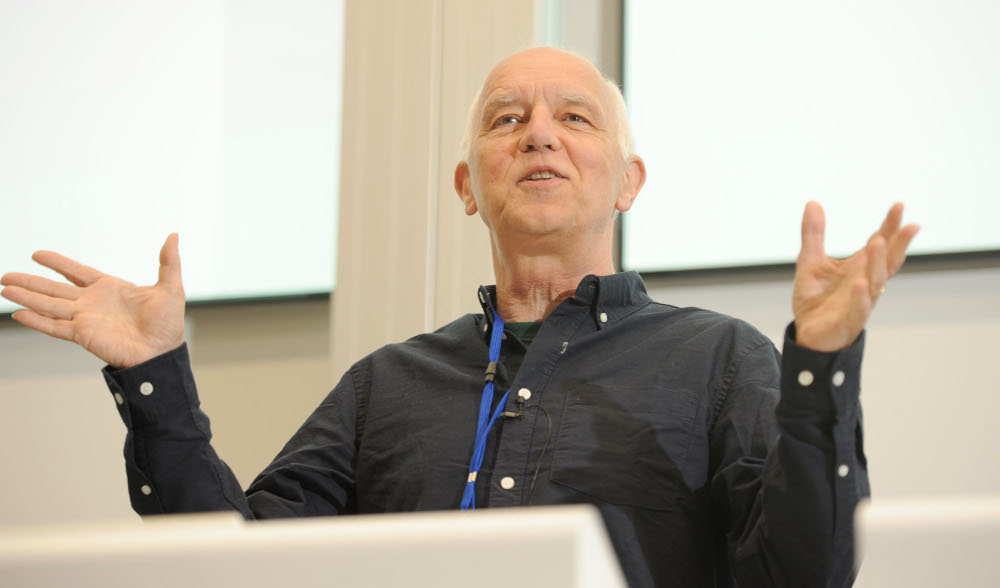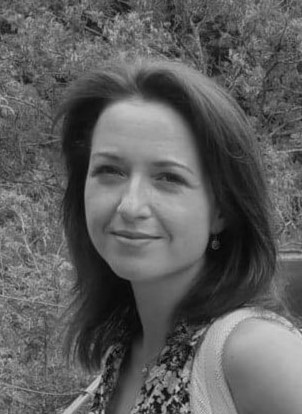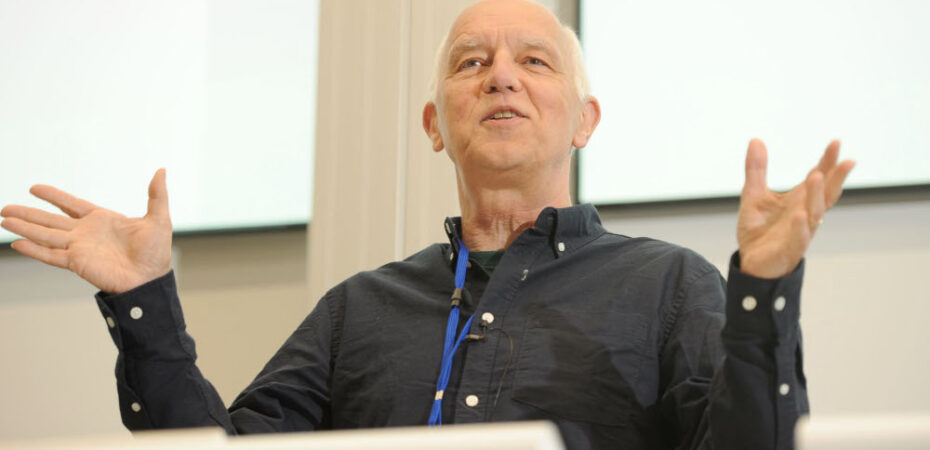
In this post, Amy Aukland writes a considered reflection on Professor Gert Biesta’s keynote talk, ‘How much research does teaching need? A case for thoughtful teaching’, delivered at the Learning & Teaching Conference. Amy is a PhD student at Moray House School of Education and Sport. This post is part of the July-August Learning & Teaching Enhancement theme: Learning and Teaching Conference 2023↗️.
You might be forgiven for thinking this a bold introduction to a keynote speech at a conference themed around the Scholarship of Learning and Teaching, but then we did invite Professor Gert Biesta to round off the opening day of the Learning and Teaching Conference 2023 with a ‘provocation’.
So is Gert suggesting that we don’t need research into teaching? Is he warning that the research we are doing is wrong? Or is he perhaps cautioning that we’re just doing too much research? No. Well, not entirely. As one of his current PhD students, I am all too aware of how Gert can destabilise your worldview with gentle yet searing insightfulness. Yet I am also aware that it is not difficult to misconstrue his meaning, especially – as he referenced himself – when everyone loves a headline. My task in this blog post, then, is to try and heed his advice by offering a thoughtful reflection on his call for more thoughtfulness towards teaching from us all.
Questioning ‘What Works’
Gert’s provocation is grounded in a critique of the pervasive improvement agendas prominent in current education research, policy and practice. These agendas are rooted in the idea that the ‘effectiveness’ of teaching can (and should) be improved by identifying and implementing particular interventions that have a positive effect on student learning, usually measured in terms of improved outcomes.
Despite originating in a well-intentioned social justice argument, Gert argues that the desire to pursue effectiveness and find ‘what works’ in the classroom has caused us to slide down a slippery slope; narrowing our view of teaching to a mechanistic process in which the right inputs (teaching interventions) will result in the right outputs (outcomes). This view of teaching implies that all knowledge about teaching practice is empirical, and that the task for education research is to devote itself to the pseudo-scientific endeavour of identifying this ‘evidence’.
A Distorted View of Teaching
Such a conception of teaching is seductive because it offers the promise of easy solutions for policymakers and practitioners to adopt; the potential for education to be ‘fixed’ by controlling the production of desired outcomes if we can only get the right amount of funding and research. The problem for Gert is that this picture presents an over-simplified account of what it means to teach – a distortion of the ‘encounter’ that occurs between student and teacher where the ‘subject-ness’ of the student is at stake. This encounter is not simply concerned with the content to be acquired or the marks to be achieved, but what the students will do with their learning and how they will exist as subjects of their own lives (for more on ‘subjectification’, see Biesta, 2020b).
Drawing on what he has coined ‘The Global Education Measurement Industry’ (Biesta, 2015a), Gert suggested that in our quest for effectiveness, we have lost sight of our ability to question what really matters in education. That is, outcomes that might have been taken as indicators of quality have now become measures of quality themselves. This is being done through a process in which we have come to value what we can measure rather than trying to measure those things that we actually value (Biesta, 2016a).
A Call to Push Back
So Gert uses his provocation to call us to action; to “push back” on the dominant pseudo-scientific model in education research. He implores us to question the underlying view of teaching that this model endorses, and to recognise a broader view of the purposes of education (for more on the purposes of education, see Biesta, 2015b). Specifically, Gert emphasises the importance of teachers looking beyond what empirical evidence can show us in the classroom, both to allow for possibilities that have not yet arisen whilst also preventing possible futures for our students from being blocked. In both these situations, the teacher must rely on trust – the offering of freedom and responsibility – as opposed to empirical evidence. Because without this trust, we deny the possibility of the transformative power of education.
Thoughtful Teachers; Thoughtful Researchers
My understanding of Gert’s message is not simply that what works won’t ever work, but that what works won’t always work. He is also reminding us that ‘working’ can easily get us into the wrong conversation about the complexities of teaching and the dynamics of education. And this is as much a problem for the practice of education as it is for educational research.
It is with this nuance that Gert is challenging us not to get caught up in the seduction of data and its promise to ‘fix’ education, but to embrace the full complexity of what makes education (and teaching) good. There is, of course, a place for measurement and evidence-based research, but it is not the only nor necessarily the most appropriate form of research for this question.
In this sense, Gert is calling for more thoughtfulness from us all; to consider carefully the conception of teaching that we are working with and the type(s) of research needed to stay true to this vision. And yes, that does mean that the way forward cannot be to just conduct more research on education. At the very least we need research that ‘fits’ the complexities of education so that it can support teaching instead of offering a seductive but, in most cases, distorted picture of teaching.
Delegates’ commentary on Gert’s talk
Gert’s provocative and energising talk made the case that we want education, not indoctrination, so teaching must be an open, semiotic, recursive activity, and educational research must treat it as such too – and not as a causal machine that comprises only its visible aspects. His refreshing take left me feeling hope for the future of education and with questions on how to get there from here.
– Professor Tim Drysdale
From all the excellent talks and workshops I attended at the conference, Gert’s was the one I find myself coming back to most often. I discussed it with colleagues straight after, and I told many other people, from the Univeristy and beyond, about this really thought-provoking lecture I’ve heard. I was particularly struck by the ‘slippery slope’ analogy: the danger that, from the undeniably worthy starting point of wanting to provide good education to everyone, we go from asking about how we can ensure high quality to valuing only/mainly that what we can measure. This is a danger we probably face in other areas too. I came away from the talk feeling encouraged and even inspired again to act as a ‘thinking professional’ who can teach what I think is most important: to help my students develop as responsible individuals.
– Professor Sabine Rolle
You can watch Gert’s keynote talk, ‘How much research does teaching need? A case for thoughtful teaching‘, in the video below:
References (and additional recommendations!)
Biesta, G.J.J. (2015a). Resisting the Seduction of the Global Education Measurement Industry: Notes on the Social Psychology of PISA. Ethics and education, 10(3), 348-360. DOI:10.1080/17449642.2015.1106030
Biesta, G.J.J. (2015b). What is Education For? On Good Education, Teacher Judgement, and Educational Professionalism. European Journal of Education, 50(1), 75–87. https://www.jstor.org/stable/26609254
Biesta, G.J.J. (2016a). Good Education in an Age of Measurement. Oxford: Routledge.
Biesta, G.J.J. (2016b). Improving education through research? From effectiveness, causality and technology, to purpose, complexity and culture. Policy Futures in Education, 14(2), 194-210. DOI: 10.1177/1478210315613900
Biesta, G.J.J. (2020a). Educational research: An unorthodox introduction. London: Bloomsbury.
Biesta, G.J.J. (2020b). Risking Ourselves in Education: Qualification, Socialization, and Subjectification Revisited. Educational Theory, 70(1), 89-104. https://doi.org/10.1111/edth.12411
Biesta, G.J.J. (2021). World-centred education. London/New York: Routledge.
 Amy Aukland
Amy Aukland
Amy is currently in the second year of her PhD in Education at Moray House, supervised by Professor Gert Biesta and Dr James MacAllister. Alongside her studies, Amy has been working as an intern for the IAD, providing organisational support for the Learning and Teaching Conference in 2022 and 2023. Inspired by her role as a former Head of Mathematics in North Wales, Amy’s research is a comparative case study that explores the extent to which secondary school teachers in Scotland and Wales feel supported to develop as good teachers within their education policy environment.



[…] Haar stuk verschijnt hier in een Nederlandse vertaling. De oorspronkelijke versie verscheen op Teaching Matters, The University of Edinburgh. Daar kun je ook de video van Biesta’s lezing bekijken. (Onder […]